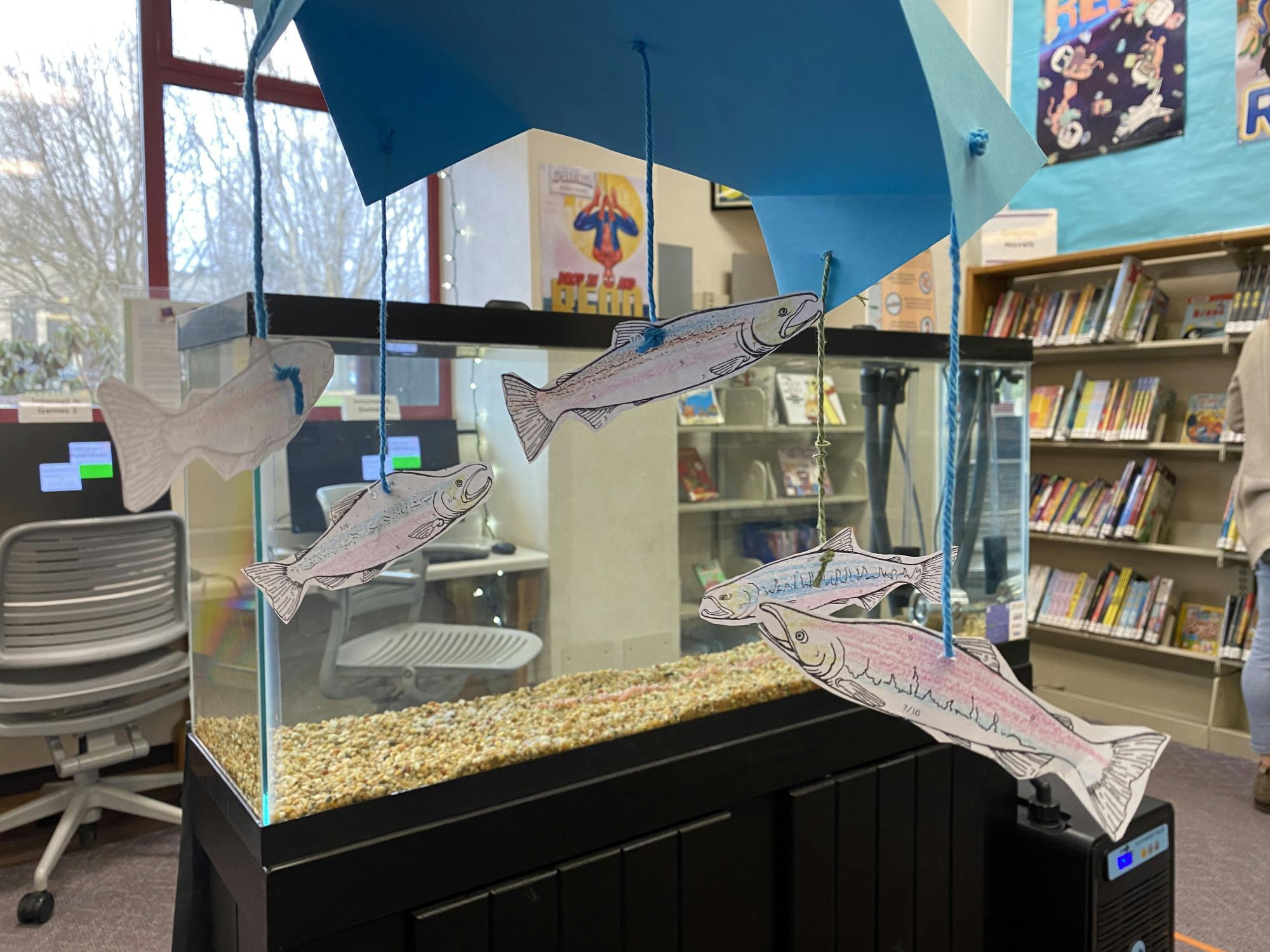The light burbling sound of water trickles over surrounding shelves of picture books, and inside a glowing tank wriggles hundreds of tiny fish with pink saccule bellies. They gather in clusters amongst the gravel, safe from the curious faces peeking in.
This salmon-rearing tank sits in the children’s department of the Bellingham Public Library’s central branch to offer the public a glimpse into the life cycle of a keystone species. The library is partnering with the Nooksack Salmon Enhancement Association to raise chum salmon eggs until their release at the end of March.
“It’s fun to give the community access to a process that you can only get usually at schools,” Deputy Library Director Bethany Hoglund said. “The public library’s perfect for that…This is the community’s spot for learning and exploration.”
Hoglund has worked at the library for over 25 years and been in her current position for almost four. She oversees the youth services for the library, which includes monitoring the space and staff surrounding the tank. Hoglund also helps with testing the water and feeding the fish.
“Learning as we go, it’s fun but also a little bit terrifying – we want to keep as many of these 200 eggs as we can alive,” Hoglund said.
Nathan Zabel, the education program manager at NSEA, runs a salmon-rearing program called Students For Salmon for fourth grade students in Whatcom County public schools. SFS offers students the opportunity to restore a stream habitat as they watch and learn about the salmon life cycle in real time. Eventually, the students release the salmon they raised in the stream they restored.
“We were missing that community piece, to get community members to be able to see salmon eggs and witness the life cycle of salmon unfold before their eyes,” Zabel said. “It was a need that we wanted to fill, and the library is a great space.”
The collaboration was made possible with a grant from the Environmental Protection Agency. The tank was installed in November 2023, to acclimate the water and generate excitement in the months before the eggs arrived.
“[The tank] draws the connection to Pacific salmon that are in our region and draws the connection to what salmon need in their habitat to be able to thrive,” Zabel said.
The eggs were welcomed to the library on Feb. 1, 2024, with a storytime from Joshua Olsen, the Whatcom County Library System’s Nooksack cultural liaison. The story was followed by a craft session to make hanging fish mobiles featuring the five different types of salmon.

A fish mobile hangs in front of the aquarium at the Bellingham Public Library in Bellingham, Wash., on Feb. 8, 2024. The color-by-number craft was available at the welcoming event and features the five different species of Pacific salmon. // Photo by Halley Buxton
The fish are permitted to be released into Whatcom Creek on March 30, 2024. The ceremony is open to the community and will include a tribal acknowledgement, the opportunity to name a fish and a pledge to action for people to incorporate salmon recovery into their daily lives.
“That’s the message that we try to bring to students and community members in this program – that their actions can make a difference in helping salmon recover in our region and beyond,” Zabel said.
Salmon face a series of threats, from dissolving habitats to climate change, that contribute to their decline.
“Salmon are known as a keystone species because they have an incredible impact on many other plant and animal species,” Zabel said. “It’s this really beautiful connection between fish and trees, and it’s mutually beneficial.”
John Thompson is the senior salmon recovery planner with Whatcom County Public Works, who are working on salmon recovery along the Nooksack River and surrounding areas. Projects are guided by the Water Resource Inventory Area 1 Salmonid Recovery Plan, which was created in 2005 to lead salmon recovery.
“What salmon are here, what they need to prosper and what has impacted them in the past…are all things that are important to the community understanding [and] supporting what we’re doing under salmon recovery,” Thompson said.
Thompson grew up fishing recreationally, but his interest in salmon habitats emerged while studying sediment impact on streams as a graduate student for Western Washington University’s geology program.
“Salmon have been a part of people’s lives here, either as commercial fishers or recreational fishers or land-owners, for many generations. It’s a very personal thing,” Thompson said.
More information on the library’s salmon events, as well as a livestream of the tank can be found here.
Halley Buxton (she/her) is a city life reporter for The Front. She is in her final year at Western with a major in creative writing and a minor in journalism. In her spare time she loves reading, writing with friends and collecting CDs. You can contact her at halleybuxton.thefront@gmail.com.






